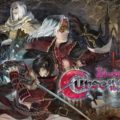Recommended Soundtracks: Onimusha: Warlords

It’s still a shock that Capcom is remastering Onimusha: Warlords, even though it was somewhat inevitable thanks to the current trend of samurai games. The original PlayStation 2 game (and the Xbox port, really) needed significant polishing to be up to par with the company’s other remasters, and needed other changes that required shelling out money they may not have wanted to spend to fix. This included redoing several backgrounds for HD resolutions, and paying Takeshi Kaneshiro to use his likeness again. Despite the main Onimusha franchise being dormant for over a decade, they thankfully felt it was worth the money to fix it up for a remaster, and that’s good for fans who want to reexperience it and others who’ve wanted to play it.
One key aspect is the soundtrack, which is being redone. It’s not that the original soundtrack hasn’t held up over time, nor has it suffered from quality issues like the Japanese voice acting, which is also being redone. (The English voice acting was never good, which they’re notably not redoing due to a presumed lack of interest.) It was a big deal when “composer” Mamoru Samuragochi was revealed to be a fraud around four-and-a-half years ago, after being labeled as the “digital-age Beethoven” in Japan. He also wasn’t deaf. It’s almost admirable that someone was able to keep up faced up for 18 years, but that’s easily cancelled out by how disgusting this was.

Because of this, the soundtrack for the remaster will have to be redone, though exactly who is doing it has yet to be announced. But this doesn’t mean we should forget how fantastic the original soundtrack was, which can now be credited to Takashi Niigaki. The original composer was well known in Japan for working on orchestral compositions, so the fact that Capcom hired him at the time was a big deal; it showed how large of a budget they were allocating to the project, alongside Kaneshiro’s likeness. The music provided a preview of the kinds of soundtracks we could expect with the then-advanced sound capabilities of the PlayStation 2, since it released shortly after the system’s launch.
This is first shown in its main theme, “Rising Sun – 1st Movement.” As its name implies, it’s a track that perfectly accompanies a historical Japanese tale — even if it’s only loosely based on history. It also sounds like an orchestral remix of a track rather than the track itself, which is exactly what made it special upon first hearing it:
Meanwhile, “Samanosuke Theme” shows how this composition style transfers over to the main game, as it accompanies some earlier action and exploration sections. It’s also the kind of theme that signifies the beginning of an epic journey, even though the scope of the impending battle between Samanosuke and Nobunaga Oda wasn’t known at this point:
Samanosuke isn’t the only playable character in the game, as his kunoichi partner Kaede is controllable for a short time. “Kaede Theme I” plays in one of the areas, which is faster-paced compared to several other tracks in the overall soundtrack. Her theme highlights the danger she’s in, as she has plenty of enemy encounters to deal with and has lower defense, but it’s also pleasant to listen to:
An alternate theme, “Kaede Theme II,” also plays in a later area. Neither track plays for long, but you can get your fill of them here.
The final track I’ll highlight is “Gale,” which plays while Samanosuke is in the Dark Realm. The theme highlights the intrigue and mystery of the alternate world, though it would have been more fitting if it wasn’t comprised of identical rooms. That’s not the track’s fault, which is excellent:
Onimusha’s soundtrack wouldn’t sound out of place in a samurai movie or show, and it was mind-blowing to hear this kind of music in a game back in 2001. The style of soundtrack is more commonplace in gaming now, but Onimusha’s soundtrack also shows how cinematic and orchestral OSTs can be melodic too. It’s an unfortunate stereotype that video games aspiring to have movie-like soundtracks favor sounding grand over having good melodic tunes. While that does apply to some soundtracks, that’s hardly the case for all of them. It’s why the good examples are worth highlighting.
Capcom has yet to confirm who will provide the soundtrack for the remaster, and whether the compositions will be remixes with better attribution or brand-new tracks, or a mixture of the two. But those potential scenarios justify the reason for this post, to highlight how good the original soundtrack was. It’s a good thing Samuragochi wasn’t used for future soundtracks in the series, which all had different main composers, and will make future remasters a little easier. That doesn’t mean Capcom won’t have other issues to deal with, nor does it mean that I won’t feature Onimusha’s progeny for future Recommended Soundtracks posts. Look forward to those, if they happen.





